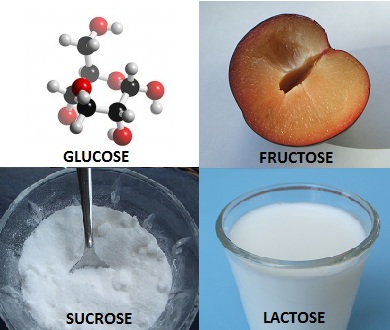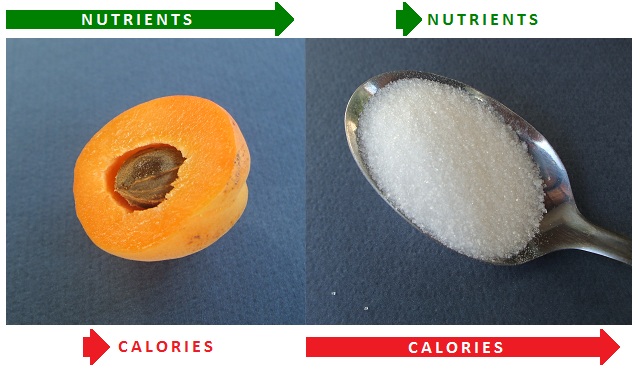 If you’re trying to discover how to overcome sugar addiction, here is a first important note: you don’t need to. Your body needs sugar, this is the simple reason why you crave sweet tastes. For example, I usually crave sweets at the end of a meal (and I satisfy these cravings with fruits).
If you’re trying to discover how to overcome sugar addiction, here is a first important note: you don’t need to. Your body needs sugar, this is the simple reason why you crave sweet tastes. For example, I usually crave sweets at the end of a meal (and I satisfy these cravings with fruits).
Be receptive with your body, it sends you specific signals to tell you what it needs in every moment.
The smart thing to do is to satisfy these needs with healthy foods, for example:
cravings of carbohydrates —> whole bread
cravings of proteins —> fish
cravings of fats —> nuts
While the non-smart thing to do is to satisfy these needs with unhealthy foods, for example:
cravings of carbohydrates —> white bread
cravings of proteins —> hamburgers
cravings of fats —> potato chips
Now let’s focus on sugar. It’s clear already that there are two ways to satisfy your -perfectly normal- cravings of sweets.
The smart one: craving of sweets —> fruits, honey, milk
The non-smart one: craving of sweets —> foods with refined sugar. Here we are!
THE “REVELATION”
You may be wondering how to overcome sugar addiction because you heard/read somewhere that sugar is bad. And they were right, but they were talking only about a specific kind of sugar: refined sugar. The white granular substance that is commonly added to coffee, chocolate, pastries, candies and countless other foods.
For its pervasiveness and for the damages it causes to health, I consider it one of the worst pleagues in the modern societies. Seriously.
Pervasiveness. Refined sugar is everywhere in processed foods. Some of them could be considered beyond suspicions, but when you check at their nutrition facts label: sugar. In white bread, canned legumes, salads, soups, sauces, ham… not to mention the atrocious amounts used in “very suspicious” foods, like sodas or pastries.
We’ve been taught from the food industry to expect an easy, sweet taste whenever we eat, whatever we eat. This is why it’s so easy to develop a sugar addiction.
Damages to health. Refined sugar is a non-food, artificially created in the industries after a lot of processing. It is the perfect “empty calories food”, meaning that it has a lot of calories (and therefore it’s fattening) but it is completely empty of nutrients. When I think at the definition “overfed and undernourished” I see refined sugar in front of my eyes.
The appetite of a person is finite. When you’re addicted to refined sugar you consume so much of it that you satiate your appetite by eating nothing (in terms of nutrition), and as consequence you prevent yourself from satiating your appetite with nutrient-dense foods.
What to do then?
THE SOLUTION
Keep eating sugar, but another kind of sugar, and in a different way. Refined sugar is not the only way to satisfy your cravings for sweets. What you should ask yourself then is not how to overcome sugar addiction in general, but: what kind of sugar should you eat? My answer is simple: eat natural sugar that:
– is packed in a food that contains other useful nutrients
– is packed in a food with a low glycemic index
The solution for overcoming a sugar addiction is simple: don’t try to overcome anything, just go for fruits when you crave sweet tastes.
SUGAR PACKED WITH OTHER NUTRIENTS
To understand the first criterion, here is a useful comparison between fruit, the healthy sugary food for excellence, and its refined unhealthy counterpart, table sugar. Both taste sweet, but there is an important difference.
Fruits are low in calories and high in nutrients. Fruits have a high nutrient density.
Table sugar is the opposite: high in calories and almost-zero in nutrients. Table sugar has a very low nutrient density.
As an example here is a nutritional table for an apricot and table sugar. Check the calories and the list of the nutrients.
Have you noticed? This is what I am talking about.
SUGAR PACKED IN FOODS WITH LOW GLYCEMIC INDEX
Another important factor in the process of overcoming refined sugar addiction is recognizing that there are four different types of basic sugar, and different ways of eating them. They are:
Glucose, the main sugar used by our cells as the primary source of energy
Fructose, the natural sugar present in fruits and vegetables
Sucrose, the common table sugar
Lactose, the sugar present in milk
There is a series of health implications when you continuously consume foods whose sugars are absorbed rapidly and sent in the blood stream (foods with high glycemic index).
This is the case of Glucose: when you eat glucose it goes to the stomach, to the intestines and then directly in the blood stream to be sent to the cells of our body. It’s absorbed very quickly.
Fructose on the other hand has a slower metabolic pathway, because it requires chemical transformations in the liver before it is sent to the blood.
Sucrose is composed by both: the molecule is half fructose and half glucose. So its glucose goes directly in the blood stream and its fructose goes in the liver for further processing.
Now, the point “which sugar is the best to eat” is not the key, since after all they’re all sugars and consumed individually and in exaggerated quantities all of them can cause troubles to the metabolism. The key point is to switch from foods with high glycemic index containing refined sugar, to foods with low glycemix index containing natural sugar, like fruits.
The reason why fruits taste sweet but have a low/medium glycemix index is that fructose in fruits is encased in a fiber rich flesh that slows and reduces its absorption in the body. Fruits satisfy any need for sweet taste and don’t cause spikes in blood sugar (and their relative negative consequences, like inflamations, continuous hunger, low energy) as refined table sugar does. Fruits win again.
AND ME?
 I discovered all this around age 20, at first motivated by being tired of all the dental caries I was having in that period.
I discovered all this around age 20, at first motivated by being tired of all the dental caries I was having in that period.
I decided to cut out refined sugar from my diet, and I did it completely. No chocolate, pastries, candies anymore. People were surprised when I told them (now they are used to it since it’s more than 12 years from my last processed sweet). The question I get asked more is “Oh my god, how can you live without sugar?” and “But you should eat sugar, your body needs it!”.
Both questions are interesting, since I actually never stopped eating sugar, I just stopped extracting it from non-nutrient, high glycemic index junk food. I never wondered how to overcome sugar addiction, and even today I eat as much sugar as anyone else if not more (I eat tons of fruits everyday).
I just made a shift, since long time. I was addicted to table sugar and now I only eat natural sweet foods: fuits, honey, milk (only organic). It really didn’t cost me a big sufference or a superhuman effort. To overcome your addiction to refined sugar, you may try to do the same.




